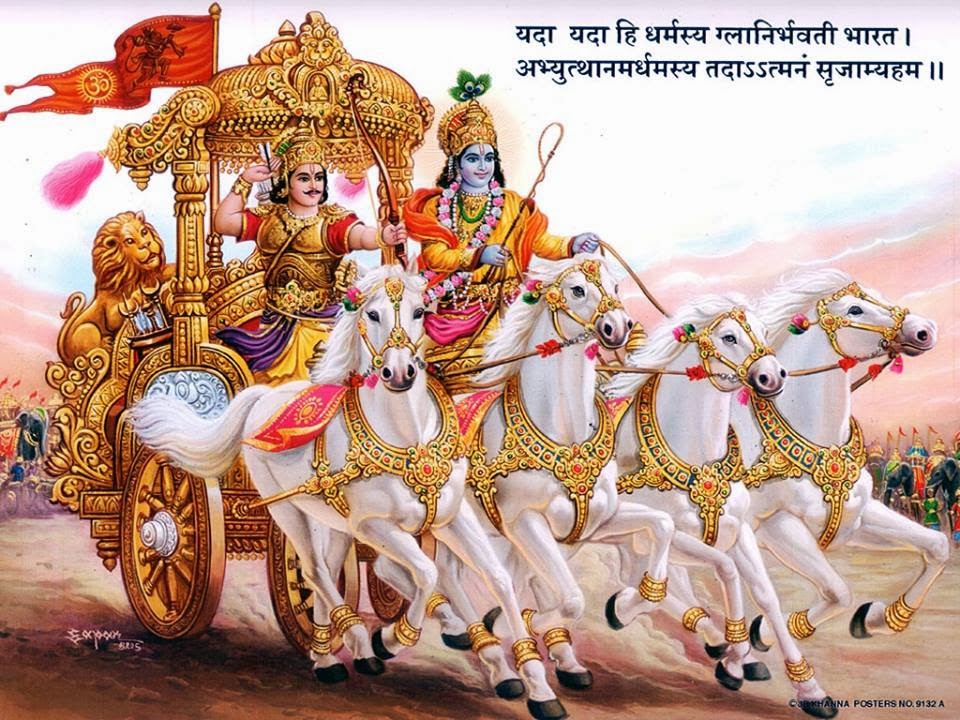
The Bhagavad Gita, or The Gita as it is famously known, is a piece of the epic Mahabharata.
The epic portrays the war between the Pandavas and the Kauravas on the combat zone of Kuru-kshetra. The Gita is the talk given by Krishna to Arjuna just before the war is going to start. Krishna is distinguished as God. His words contain the substance of Vedic astuteness, the cornerstone of Hinduism.
In contrast, to present-day composing, The Gita isn't direct.
Customarily, a master would just expand on a specific stanza or a lot of sections or a part of The Gita at once. It is just in present-day times, with a printed book close by, that we need to peruse The Gita spread to cover, part by section, refrain to stanza, and plan to work our way through to a peak of goals in one go. At the point when we endeavor to do as such, we are baffled.
For, in contrast, to present-day composing, The Gita isn't straight: a few thoughts are dissipated more than a few parts, numerous thoughts are always rehashed, and still others assume the information on ideas found somewhere else, in prior Vedic and Upanishadic writings. Indeed, The Gita explicitly alludes to the Brahma Sutras, otherwise called Vedanta sutras, said to have been formed by one Badarayana, some of the time related to Vyasa. Further, at places, similar words are utilized in various refrains to pass on various implications, and on different occasions, various words are utilized to pass on a similar thought.
For instance, now and then the word 'Atma' signifies mind and now and again soul; at different occasions, different words like dehi, brahmana, and Purusha are utilized for the soul rather than Atma. This can be somewhat bewildering to an easygoing peruser, and open to different translations.
We never really hear what Krishna told Arjuna. We just catch what Sanjaya transmitted loyally to the visually impaired lord Dhritarashtra.
We never really hear what Krishna told Arjuna. We basically catch what Sanjaya transmitted dependably to the visually impaired ruler Dhritarashtra in the solaces of the royal residence, having seen all that happened in the inaccessible war zone, on account of his clairvoyant sight.
The Gita we catch is basically that which is described by a man with no authority however interminable sight (Sanjaya) to a man with no sight yet full power (Dhritarashtra). This curious structure of the story causes' to notice the huge hole between what is told and what is heard.
Krishna and Sanjaya may talk the very same words, yet while Krishna recognizes what he is discussing, Sanjaya doesn't. Krishna is the source, while Sanjaya is just a transmitter. Similarly, what Sanjaya hears is unique in relation to what Arjuna hears and what Dhritarashtra hears. Sanjaya hears the words, however, it doesn't waste time with the significance.
Arjuna is a searcher thus he chooses what he hears to discover an answer for his concern. Dhritarashtra isn't keen on what Krishna needs to state. While Arjuna poses numerous inquiries and explanations, guaranteeing the 'talk' is a 'discussion', Dhritarashtra stays quiet all through.
Truth be told, Dhritarashtra is dreadful of Krishna who is battling against his kids, the Kauravas. Along these lines, he makes a decision about Krishna's words, tolerating what serves him, rejecting what doesn't.
The mission for target truth (what did Krishna really state?) perpetually brings about vi-vaad, contention, where you attempt to demonstrate that your fact is real and I attempt to demonstrate that my fact is reality.
The mission for emotional truth (how does The Gita sound good to me?) brings about sam-vaad, where you and I look to value each other's perspectives and extend our separate certainties. It enables everybody to find The Gita at their own pace, on their own terms, by tuning in to the different Gitas around them.
Before we proceed onward to the exercises let us take a gander at a portion of the realities about Bhagwat Gita:
- Gita is a piece of Mahabharata.
- It is a piece of Bhishma Parva of Mahabharata (Chapters 25 to 42).
- Mahabharata is an epic sacred text of Hinduism.
- Bhagavad Gita comprises 18 Chapters and it has 700 stanzas. It is written in Sanskrit.
- It is a discussion among Arjuna and Krishna at the war zone of Kurukshetra.
- In the war zone when Arjuna was not able to choose what is correct and what's going on, he posed a few inquiries to Krishna, Gita catches these inquiries of Arjuna and Krishna's responses to those inquiries.
The exacting importance of Gita is "Melody of God".
The principal topic of Gita is Dharma (Holy Duty). It portrays the diverse Yoga-Bhakti, Karma, Jnana; and Moksha or freedom. A few editorials have been composed of Gita. For example, Sa?kara, Ramanuja, Chaitanya Mahaprabhu, Bhaskara, Madhva. These discourses differ from one another in perspectives and importance.
Charles Wilkins deciphered the Gita in English without precedent for 1785. Later it was additionally converted into various European dialects. It is accepted that three others other than Arjuna listened to the Gita straightforwardly from Krishna. They were Sanjay, Hanuman, Barbarik child of Ghatotkach.
"Give up the products of your activities."
At the point when we work remembering our rewards for so much hard work, we can never truly put forth a valiant effort. This is on the grounds that we are excessively fixated on the potential prizes. We are stressed by our best in it. It additionally gives us plenty of stress over the outcome. We may likewise feel debilitated if our assignment or activity doesn't yield great yields. Along these lines, simply doing our work without truly contemplating its outcome should be our thought process. Discover happiness in the adventure you are on, paying little respect to the result!
"Life is a combat zone: Fight intensely"
In any event, when the dividers are disintegrating around you and the earth is breaking underneath your feet, don't expect or fear anything. Desires and fears limit our potential outcomes.
"Our spirit never bites the dust"
Our spirit never bites the dust. Considerably after our passing, it keeps on existing. It is eternal. It just changes bodies after the demise of an individual. Additionally, our body is comprised of 'agni' (fire), 'jal' (water), 'vayu'(wind), 'prithvi' (earth) and it consolidates with them in the afterlife.
"Acknowledge the dualities of life"
Envision your most dishonorable minute and afterward envision yourself calm in it, sitting unobtrusively while the leaves of stress drift away in the breeze. Feeling tragic about your misfortunes will just path you down. Acknowledge your longing without desiring or requiring what you need.
"We as a whole need to bite the dust one day"
This world isn't unfading. One who takes birth needs beyond words day. That is a definitive truth of this world. Nothing exists for all time. One needs to leave this world, despite the fact that he wishes not to. No enchantment can really assist an individual with staying until the end of time. Everybody has their set life periods.
"Acknowledge the serenity of life"
At the point when you consider all to be as equivalent in affliction and in delight when you are established in the unity everything being equal, you can't love or despise anybody since it is all piece of something very similar. As such, love your foe as yourself. Decline to talk seriously about the individuals who hurt you or your adversaries.
"Progress and improvement are the standards of this Universe"
Things may not be the equivalent, the manner in which they used to be. Things and conditions change. We should neither anticipate individuals nor the environment, not by any means society, to be the equivalent. They all change with time. We push forward. The Universe overlooks old things and moves advances do as well, we. We ought not to adhere to one spot. That will make our reality considerably more dangerous in this world.
"Each activity and deed of our own ought to be devoted to Krishna"
Whatever we do over the span of our life ought to be committed to the incomparable character of Godhead. This will consistently bring about giving us harmony and fulfillment. One ought to recall Krishna during each activity of our own. This makes us feel God's quality with every one of us the time, describing every one of our activities turns as positive.
"Krishna is consistently there for you"
Krishna is a definitive help of any person. Our kindred people may not enjoy us or backing as or may even leave us in our terrible occasions, yet Krishna is consistently there for us. The individual who realizes this fact is never truly grieved by trouble or despondency.
"Krishna is the preeminent"
Krishna is the preeminent character of Godhead. He is the first reason for all causes. He begins everything and closes everything as well. He is there all over the place. He is ubiquitous and supreme. We are simply manikins whom he controls. He is divine and supernatural.
"Wants to go back and forth"
Wants to go back and forth, yet one ought to stay an impartial observer, just watching and having fun. Everybody encounters wants yet one ought not to be moved by them. They ought not trouble an individual. Individuals in some cases embrace extremely insidious activities due to their wants. One ought to just not get trapped in the chains of want.
"A mind fixated on cash can't contemplate"
Bhagavad Gita gabs about contemplation and its significance. Reflection is considered amazingly supportive for internal harmony and 'sadhna'. In addition, an individual who ponders profiting all the time can't generally participate in reflection. At the point when an individual's mind isn't steady and the individual ponders cash, at that point contemplation would be a bombed exertion for such an individual.

